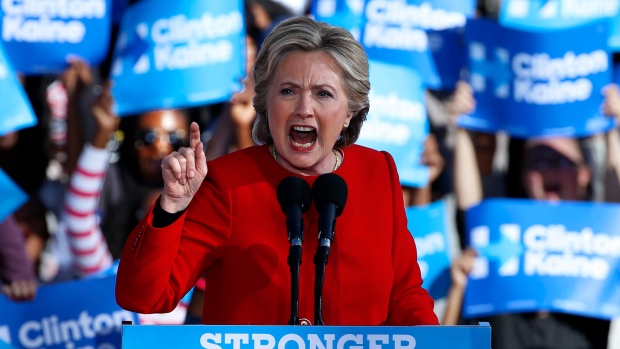Nov 7, 2016
Dow surges most since January after FBI clears Clinton in email probe
, Reuters

Wall Street rallied on Monday, the eve of the U.S. presidential election, as Democratic nominee Hillary Clinton's prospects brightened after the FBI said it would not press criminal charges related to her use of a private email server.
The gains were broad based, with all 30 Dow components and all 11 major S&P 500 sectors rising. U.S. stocks were set for their biggest one-day percentage gain since March 1, while a volatility measure was set for its biggest drop since late June.
The Dow closed up 371.32 points at 18,259.60, good for its biggest single-day points gain since January. Meanwhile, gold shed $25.10 to close at $1,279.40, it's biggest drop in a month.
IShares MSCI Mexico ETF, known of late as the "Trump ETF", soared 5.6 per cent and was on track for its best day in more than five years. The ETF is viewed as a barometer for Republican Donald Trump's chances of winning the election since his policies are considered negative for Mexico.
Wall Street closed lower for nine days in a row through Friday, their longest losing streak in more than 35 years and one that gained momentum after the FBI said on Oct. 28 that it was reviewing some newly found Clinton emails.
The FBI said on Sunday that it stood by its July finding that Clinton was not guilty of criminal wrongdoing.
While, polls last week showed Trump had been closing the gap, at least five major polls on Monday showed Clinton still had the lead in the race for the White House.
"Clinton is a known quantity and investors hate uncertainty and they are very happy even if taxes were to go up ... In the case of Trump, it is uncertain as to what he stands for," said Komal Sri-Kumar, president of Sri-Kumar Global Strategies.
The narrowing of the gap in light of Hillary Clinton's email woes had spooked investors.
"The market hates uncertainty; it's tough to fall back on a cliche but it is literally true," said Peter Jankovskis, co-chief investment officer at OakBrook Investments LLC in Lisle, Illinois. "Prior to those revelations, people saw Clinton kind of cruising to a victory and that put it in some doubt."
Investors have tended to see Clinton as a more status quo candidate. On the other hand, Trump's stance on foreign policy, trade and immigration has unnerved the market.
"The markets have been comforted as it appears that either a Trump victory or a Democratic landslide are not coming to pass," said Eric Wiegand, senior portfolio manager at the Private Client Reserve at U.S. Bank.
In Toronto, the S&P/TSX composite index gained 143.20 points to close at 14,652.45.
The Canadian dollar settled at 74.78 cents US, up 0.17 of a cent from Friday's close.
The S&P 500 was up 46.34 points at 2,131.52 and the Nasdaq Composite was up 119.80 points at 5,166.17.
The CBOE Volatility index, dubbed Wall Street's "fear gauge", was down 16.5 per cent, on pace for its biggest one-day fall since June 28, a few days after Britain voted to leave the European Union.
The financials' 2.4 per cent rise led the gainers among the 11 S&P sectors. Investors expect a Clinton victory to not hinder a potential U.S. interest rate hike next month.
The defensive telecom services and utilities were the only sectors notching gains below 1 per cent.
Risk assets were back in favor. Brent crude futures rose for the first time in seven days. Even the dollar's first rise in five days did little to hamper the gain.
Safe-haven gold was set for its worst day in more than one month. Gold miner Newmont's 4.4 per cent-drop was the biggest on the S&P.
Biogen rose 6.7 per cent to US$295.65 after the drugmaker and Ionis announced positive interim trial data. Ionis shares soared 18.54 per cent to US$32.16.
Advancing issues outnumbered decliners on the NYSE by 2,539 to 393. On the Nasdaq, 2,302 issues rose and 475 fell.
The S&P 500 index showed 12 new 52-week highs and no new lows, while the Nasdaq recorded 59 new highs and 55 new lows.






